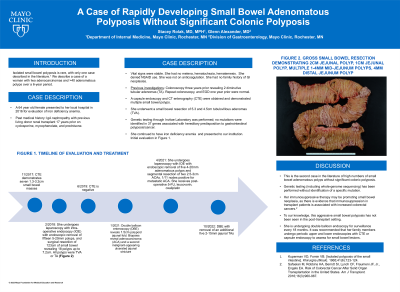Monday Poster Session
Category: Small Intestine
P2651 - A Case of Rapidly Developing Small Bowel Adenomatous Polyposis Without Significant Colonic Polyposis
Monday, October 23, 2023
10:30 AM - 4:15 PM PT
Location: Exhibit Hall

Has Audio
- SR
Stacey Rolak, MD, MPH
Mayo Clinic
Rochester, MN
Presenting Author(s)
Stacey Rolak, MD, MPH, Glenn Alexander, MD
Mayo Clinic, Rochester, MN
Introduction: Isolated small bowel polyposis is rare. A woman presented with two adenocarcinomas (ACAs) and > 40 adenomatous polyps over a 6 year period.
Case Description/Methods: A 64 year old female presented to her local hospital in 2016 for evaluation of iron deficiency anemia. She had a history of IgA nephropathy with renal transplant on cyclosporine, mycophenolate and prednisone. She had no signs of GI bleeding or family history of GI neoplasia. She had a previous colonoscopy that revealed 2 diminutive tubular adenomas (TA). A repeat colonoscopy and EGD were normal. Capsule endoscopy and CT enterography (CTE) demonstrated small bowel masses. She underwent a small bowel resection of 5.3 and 4.5cm tubulovillous adenomas (TVA). An Invitae genetic panel was negative. She continued to have iron deficiency anemia and presented to our institution. She underwent the following evaluation and treatment.
In 11/2017, CTE demonstrated 7 1.3-3.2cm small bowel masses. In 2/2018, she underwent laparoscopy with intraoperative endoscopy (IOE) with endoscopic removal of 15 5-20mm polyps, with surgical resection of 123cm of small bowel revealing 18 polyps up to 7.2cm. All polyps were TVAs or TAs (Figure 1). CTE was negative in 6/2019. In 1/2021, double balloon enteroscopy (DBE) revealed a 1.5cm polypoid jejunal fold with biopsies revealing ACA and a second malignant appearing ulcerated jejunal stricture. In 4/2021 she underwent laparoscopy with IOE with endoscopic removal of 5 4-20mm TA polyps and segmental resection of 2 2.5-3cm ACAs with 1/11 nodes positive for metastatic ACA. She received postoperative 5-FU, leucovorin, and oxaliplatin. In 2/2022 she had DBE with removal of 5 2-15mm jejunal TAs and in 10/2022 removal of 5 additional 2-15m jejunal TAs. In total she has undergone resection of two ACAs and > 40 adenomatous polyps with several polyps between 3-7cm in size. She is undergoing surveillance with annual DBE.
Discussion: This is the second case in the literature of high numbers of small bowel adenomatous polyps without significant colonic polyposis. Genetic testing (including whole-genome sequencing) has been performed without identification of a mutation to explain this. It is conceivable that her immunosuppressive therapy is promoting small bowel neoplasia, as there is evidence that immunosuppression in transplant patients is associated with increased colorectal cancers. To our knowledge this aggressive small bowel polyposis has not been seen in this clinical setting.

Disclosures:
Stacey Rolak, MD, MPH, Glenn Alexander, MD. P2651 - A Case of Rapidly Developing Small Bowel Adenomatous Polyposis Without Significant Colonic Polyposis, ACG 2023 Annual Scientific Meeting Abstracts. Vancouver, BC, Canada: American College of Gastroenterology.
Mayo Clinic, Rochester, MN
Introduction: Isolated small bowel polyposis is rare. A woman presented with two adenocarcinomas (ACAs) and > 40 adenomatous polyps over a 6 year period.
Case Description/Methods: A 64 year old female presented to her local hospital in 2016 for evaluation of iron deficiency anemia. She had a history of IgA nephropathy with renal transplant on cyclosporine, mycophenolate and prednisone. She had no signs of GI bleeding or family history of GI neoplasia. She had a previous colonoscopy that revealed 2 diminutive tubular adenomas (TA). A repeat colonoscopy and EGD were normal. Capsule endoscopy and CT enterography (CTE) demonstrated small bowel masses. She underwent a small bowel resection of 5.3 and 4.5cm tubulovillous adenomas (TVA). An Invitae genetic panel was negative. She continued to have iron deficiency anemia and presented to our institution. She underwent the following evaluation and treatment.
In 11/2017, CTE demonstrated 7 1.3-3.2cm small bowel masses. In 2/2018, she underwent laparoscopy with intraoperative endoscopy (IOE) with endoscopic removal of 15 5-20mm polyps, with surgical resection of 123cm of small bowel revealing 18 polyps up to 7.2cm. All polyps were TVAs or TAs (Figure 1). CTE was negative in 6/2019. In 1/2021, double balloon enteroscopy (DBE) revealed a 1.5cm polypoid jejunal fold with biopsies revealing ACA and a second malignant appearing ulcerated jejunal stricture. In 4/2021 she underwent laparoscopy with IOE with endoscopic removal of 5 4-20mm TA polyps and segmental resection of 2 2.5-3cm ACAs with 1/11 nodes positive for metastatic ACA. She received postoperative 5-FU, leucovorin, and oxaliplatin. In 2/2022 she had DBE with removal of 5 2-15mm jejunal TAs and in 10/2022 removal of 5 additional 2-15m jejunal TAs. In total she has undergone resection of two ACAs and > 40 adenomatous polyps with several polyps between 3-7cm in size. She is undergoing surveillance with annual DBE.
Discussion: This is the second case in the literature of high numbers of small bowel adenomatous polyps without significant colonic polyposis. Genetic testing (including whole-genome sequencing) has been performed without identification of a mutation to explain this. It is conceivable that her immunosuppressive therapy is promoting small bowel neoplasia, as there is evidence that immunosuppression in transplant patients is associated with increased colorectal cancers. To our knowledge this aggressive small bowel polyposis has not been seen in this clinical setting.

Figure: Figure 1. Gross small bowel resection demonstrating 2cm jejunal polyp, 1cm jejunal polyp, multiple mid jejunum polyps, 4mm distal jejunum polyp.
Disclosures:
Stacey Rolak indicated no relevant financial relationships.
Glenn Alexander indicated no relevant financial relationships.
Stacey Rolak, MD, MPH, Glenn Alexander, MD. P2651 - A Case of Rapidly Developing Small Bowel Adenomatous Polyposis Without Significant Colonic Polyposis, ACG 2023 Annual Scientific Meeting Abstracts. Vancouver, BC, Canada: American College of Gastroenterology.
